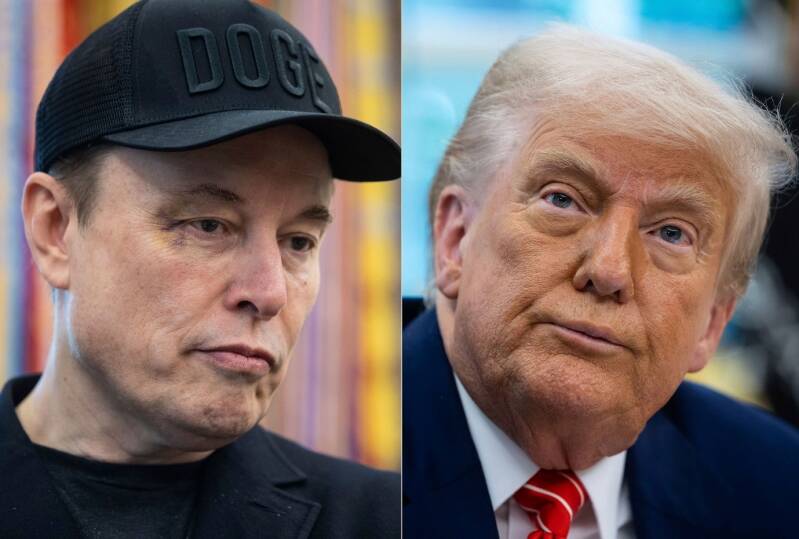A political storm has erupted between two of the most influential figures in American politics and technology: former President Donald Trump and SpaceX CEO Elon Musk. Less than a week after their seemingly cordial Oval Office farewell—marking the end of Musk's status as a Special Government Employee—their relationship has soured dramatically. Now, Musk is threatening to decommission SpaceX’s Dragon spacecraft, a move that could destabilize operations aboard the International Space Station (ISS), while Trump is considering ending SpaceX’s lucrative government contracts and subsidies.

The feud exploded publicly just days after the May 30 meeting, when Musk sharply criticized a House-passed reconciliation bill that awaits Senate review. Calling the legislation a “disgusting abomination,” Musk condemned it for boosting government spending rather than reducing it. Trump, who has championed the bill, fired back, accusing Musk of opposing it simply because it phases out subsidies for electric vehicles such as Tesla’s.
Trump escalated matters further during a press briefing alongside German Chancellor Friedrich Merz, where he addressed the fallout from his decision to withdraw Jared Isaacman’s nomination to head NASA. Musk had recommended Isaacman—an accomplished commercial astronaut and entrepreneur—for the role. Though Isaacman’s nomination had passed the Senate Commerce Committee with bipartisan support, the White House abruptly pulled the plug, citing previously known political donations to Democratic candidates. Trump defended the withdrawal, stating that appointing a “totally Democrat” nominee was not aligned with the administration’s goals, despite acknowledging Musk’s endorsement.
“You know, [Musk] recommended somebody that he, I guess, knew very well… I didn’t think it was appropriate,” Trump said. “We won. We get certain privileges, and one of those is to appoint a Republican to run NASA.”
Isaacman, speaking on a podcast this week, described himself as “relatively apolitical” and suggested he was used as a pawn in a broader dispute. “People with axes to grind made a point,” he said.
As tensions flared, the conflict spilled onto social media. Musk took to X (formerly Twitter), lambasting the bill and questioning Trump’s motives. Trump countered on Truth Social, proposing that terminating SpaceX’s “billions and billions” in subsidies and government contracts could help reduce spending—ironically addressing Musk’s own fiscal criticisms.
Musk’s response was immediate and incendiary: he threatened to begin decommissioning SpaceX’s Dragon spacecraft—both Crew Dragon and Cargo Dragon—critical to supporting the ISS. “We’ll begin the process right now if it comes to that,” Musk posted on X.
The implications are far-reaching. Crew Dragon is the only operational U.S. vehicle capable of transporting astronauts to and from the ISS. Cargo Dragon is one of only two spacecraft that can deliver supplies to the orbiting lab. Boeing’s Starliner, the other spacecraft under NASA’s Commercial Crew Program, has yet to become fully operational. Without Crew Dragon, the U.S. would risk losing its only independent human access to space, a fallback that previously cost NASA hundreds of millions when it relied on Russian Soyuz spacecraft.
Further complicating matters, SpaceX is also the prime contractor for NASA’s U.S. Deorbit Vehicle (USDV), which is intended to guide the ISS safely into the Pacific Ocean at the end of its operational life—currently scheduled for 2030. Musk has previously stated he believes the ISS should be decommissioned earlier, perhaps as soon as 2027, but this latest move suggests he may be willing to force the timeline.
SpaceX is NASA’s second-largest contractor and a key player in national defense, providing satellite launches and secure communications via its Starlink and Starshield systems. Its Falcon 9 and Falcon Heavy rockets are vital for Department of Defense missions, and the Starship system is central to NASA’s Artemis program to return astronauts to the Moon.
Cutting ties with SpaceX would not only risk international space cooperation and national security but also deeply impact America’s space ambitions. Industry analysts warn that any abrupt cancellation of contracts could cause cascading delays across both civil and military programs.
Despite the high-stakes standoff, some hope for reconciliation remains. Senator Tim Sheehy (R-MT), who introduced Isaacman during his confirmation hearing, defended him on social media and urged the administration not to politicize NASA leadership. “We must support individuals who bring technical excellence to the table, regardless of party,” Sheehy posted.
With neither Trump nor Musk backing down, the consequences of this power struggle could be profound—for the future of space exploration, national security, and the ISS itself.
As of press time, Musk is doubling down on his attacks, while Trump continues to defend the bill and his decision to rescind Isaacman’s nomination. Whether cooler heads will prevail, or this clash will send shockwaves through U.S. space policy, remains to be seen.


Add comment
Comments